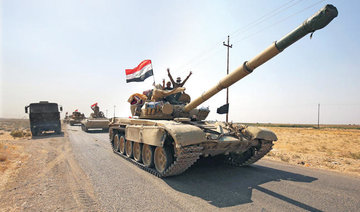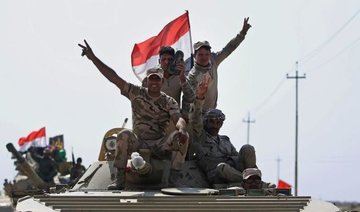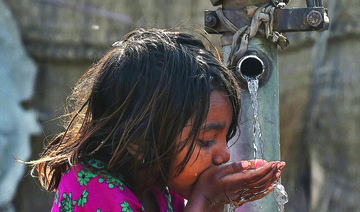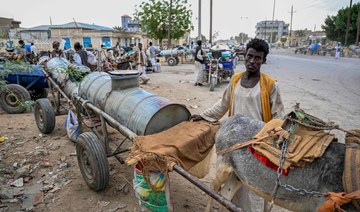BAGHDAD: Iraqi Federal Police and allied Shiite-dominated paramilitary forces recaptured the northern city of Kirkuk with hardly a shot fired on Monday after Kurdish forces split in two and one group refused to fight.
A convoy of troops, tanks and armored vehicles from Iraq’s elite Counter-Terrorism Force seized the provincial government headquarters, key military sites and an oil field on Monday afternoon, less than a day after the military operation began.
Thousands of Kurdish civilians fled the city of 1 million people for fear of reprisals, and a curfew was imposed from 7 p.m. to 7 a.m. A Kurdish father of four driving north out of Kirkuk toward the Kurdish regional capital Irbil said: “We no longer feel safe. We hope to return to our home but right now we feel it’s dangerous for us to stay.”
Crowds of ethnic Turkmen who opposed Kurdish control of the city were celebrating. Some drove in convoys with Iraqi flags and fired shots in the air.
The US called for calm. President Donald Trump said he regretted the conflict but would not take sides. The US Embassy in Baghdad called on all parties to “immediately cease military action.”
Kirkuk and its lucrative oil fields have been held by Kurdish forces since 2014, when the Iraqi Army fled in the face of an onslaught by Daesh militants.
Their recapture by Baghdad was simplified by internal strife among the Kurds, who have been divided for decades into two main factions; the PDK (Kurdistan Democratic Party) of regional government leader Masoud Barzani and the PUK (Patriotic Union of Kurdistan) of his longtime rival Jalal Talabani, who was Iraq’s president from 2003 to 2014 and died two weeks ago. Both parties control their own Peshmerga fighters.
Kurdish forces controlled by Baffal Talabani, the late president’s son, withdrew from their positions without fighting in an agreement with the federal government on Saturday night.
The PDK accused them of “treason” on Monday for allowing Baghdad’s forces to recapture Kirkuk unopposed. “We regret that some PUK officials helped in this plot,” it said. “They gave up some sensitive areas and withdrew from them without any fighting.”
PUK troops in Jalwlaa, Mandily and Qaratabbah towns in southern Diyala province were also withdrawn on Monday. More areas in Nineveh, Salahuddin, Diyala and Kirkuk provinces are expected to be handed over in the next 24 hours, military sources told Arab News.
“The Peshmerga of PUK were always in the forefront to defend the sons of Kirkuk and protect them from terrorism, but we will not sacrifice a drop of blood to maintain stolen oil fields,” said Alla Talabani, a senior Kurdish leader and head of the PUK federal parliamentary bloc.
Iraqi Prime Minister Haider Al-Abadi said: “We assure our people in Kurdistan and in Kirkuk in particular that we are keen on their safety and best interests. We have only acted to fulfill our constitutional duty to extend the federal authority and impose security and protect the national wealth in this city.”
The recapture of Kirkuk is the latest measure taken by Baghdad since Kurds in northern Iraq voted overwhelmingly for independence in a referendum last month condemned by the federal government as illegal and unconstitutional.
Iraqi federal officials and military officers told Arab News that their forces would not stop until they recapture all the disputed areas that have been controlled by Kurdish forces, some since 2003.
“The goal is all the disputed areas, not just Kirkuk and its surroundings,” said Ihssan Al-Shimari, one of Al-Abadi’s advisers. “We will gain back all these areas and liberate the western areas of Anbar seized by Daesh.”
Iraqi troops storm into Kirkuk without a fight
Iraqi troops storm into Kirkuk without a fight
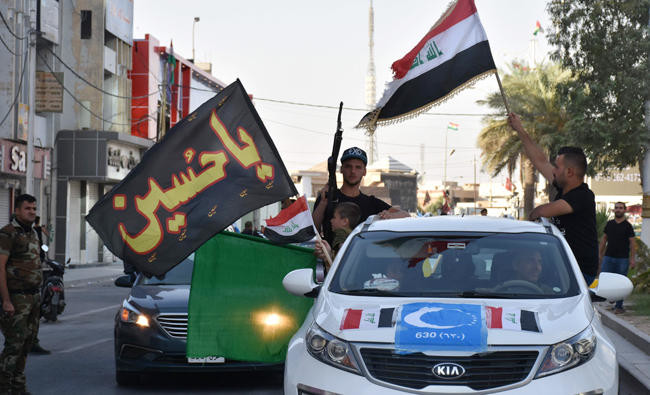
Afghan Taliban government says to attend third round of UN-hosted Doha talks

- Mujahid told local media on Sunday the decision had been made to send a delegation, the members of which would be announced later, because it was deemed “beneficial to Afghanistan”
KABUL: Taliban authorities will attend the third round of United Nations-hosted talks on Afghanistan in the Qatari capital, a government spokesman told AFP on Sunday, after snubbing an invitation to the previous round.
“A delegation of the Islamic Emirate will participate in the coming Doha conference. They will represent Afghanistan there and express Afghanistan’s position,” Taliban government spokesman Zabihullah Mujahid said of the talks, which are scheduled to start June 30.
The participation of the Taliban authorities in the two-day conference of special envoys on Afghanistan had been in doubt after they were not included in the first round and then refused an invitation to the second round in February.
Mujahid told local media on Sunday the decision had been made to send a delegation, the members of which would be announced later, because it was deemed “beneficial to Afghanistan”.
Hamas response to Gaza ceasefire proposal ‘consistent’ with principles of US plan, leader says

- Egypt and Qatar said on June 11 that they had received a response from the Palestinian groups to the US plan
CAIRO: Hamas’ response to the latest Gaza ceasefire proposal is consistent with the principles put forward in US President Joe Biden’s plan, the group’s Qatar-based leader Ismail Haniyeh said in a televised speech on the occasion of the Islamic Eid Al-Adha on Sunday.
“Hamas and the (Palestinian) groups are ready for a comprehensive deal which entails a ceasefire, withdrawal from the strip, the reconstruction of what was destroyed and a comprehensive swap deal,” Haniyeh said, referring to the exchange of Israeli hostages for Palestinian prisoners.
On May 31, Biden laid out what he called a “three-phase” Israeli proposal that would include negotiations for a permanent ceasefire in Gaza as well as phased exchanges of Israeli hostages for Palestinian prisoners held in Israel.
Egypt and Qatar — which along with the United States have been mediating between Hamas and Israel — said on June 11 that they had received a response from the Palestinian groups to the US plan, without giving further details.
While Israel said Hamas rejected key elements of the US plan, a senior Hamas leader said that the changes the group requested were “not significant”.
Red Sea crisis intensifies economic strain on Yemenis ahead of Eid

- Sales have decreased by 80 percent
- Over 1.2 million civil servants have not received salaries in eight years, and hundreds of thousands have lost their jobs
DUBAI: Yemen, suffering from nearly a decade of civil war, now faces an additional challenge: a crippled economy further strained by the escalating crisis in the Red Sea.
Market vendors in Sanaa’s Old City, the Al-Melh, claim that sales have decreased by 80 percent, according to a report by Chinese news agency Xinhua.
Shopkeepers attribute this decline to recent increases in sea shipping costs, which have driven up wholesale prices.
This situation reflects the broader economic crisis in Yemen, where rising sea shipping costs have increased prices across the board, making basic Eid essentials unaffordable for many.
To help ease financial strain, an exhibition was organized in Al-Sabeen Park, where families were able to sell homemade goods.
Despite these efforts, Yemen’s economic problems persist. According to the UN, the decade-long war has pushed millions into poverty. Over 1.2 million civil servants have not received salaries in eight years, and hundreds of thousands have lost their jobs. The Norwegian Refugee Council reports that four out of five Yemenis face poverty, and over 18 million people urgently need humanitarian aid.
Water crisis batters war-torn Sudan as temperatures soar

- The country at large, despite its many water sources including the mighty Nile River, is no stranger to water scarcity
- This summer, the mercury is expected to continue rising until the rainy season hits in August
PORT SUDAN, Sudan: War, climate change and man-made shortages have brought Sudan — a nation already facing a litany of horrors — to the shores of a water crisis.
“Since the war began, two of my children have walked 14 kilometers (nine miles) every day to get water for the family,” Issa, a father of seven, said from North Darfur state.
In the blistering sun, as temperatures climb past 40 degrees Celsius (104 degrees Fahrenheit), Issa’s family — along with 65,000 other residents of the Sortoni displacement camp — suffer the weight of the war between Sudan’s army and the paramilitary Rapid Support Forces (RSF).
When the first shots rang out more than a year ago, most foreign aid groups — including the one operating Sortoni’s local water station — could no longer operate. Residents were left to fend for themselves.
The country at large, despite its many water sources including the mighty Nile River, is no stranger to water scarcity.
Even before the war, a quarter of the population had to walk more than 50 minutes to fetch water, according to the United Nations.
Now, from the western deserts of Darfur, through the fertile Nile Valley and all the way to the Red Sea coast, a water crisis has hit 48 million war-weary Sudanese who the US ambassador to the United Nations on Friday said are already facing “the largest humanitarian crisis on the face of the planet.”
Around 110 kilometers east of Sortoni, deadly clashes in North Darfur’s capital of El-Fasher, besieged by RSF, threaten water access for more than 800,000 civilians.
Medical charity Doctors Without Borders (MSF) on Friday said fighting in El-Fasher had killed at least 226.
Just outside the city, fighting over the Golo water reservoir “risks cutting off safe and adequate water for about 270,000 people,” the UN children’s agency UNICEF has warned.
Access to water and other scarce resources has long been a source of conflict in Sudan.
The UN Security Council on Thursday demanded that the siege of El-Fasher end.
If it goes on, hundreds of thousands more people who rely on the area’s groundwater will go without.
“The water is there, but it’s more than 60 meters (66 yards) deep, deeper than a hand-pump can go,” according to a European diplomat with years of experience in Sudan’s water sector.
“If the RSF doesn’t allow fuel to go in, the water stations will stop working,” he said, requesting anonymity because the diplomat was not authorized to speak to media.
“For a large part of the population, there will simply be no water.”
Already in the nearby village of Shaqra, where 40,000 people have sought shelter, “people stand in lines 300 meters long to get drinking water,” said Adam Rijal, spokesperson for the civilian-led General Coordination for Displaced Persons and Refugees in Darfur.
In photos he sent to AFP, some women and children can be seen huddled under the shade of lonely acacia trees, while most swelter in the blazing sun, waiting their turn.
Sudan is hard-hit by climate change, and “you see it most clearly in the increase in temperature and rainfall intensity,” the diplomat said.
This summer, the mercury is expected to continue rising until the rainy season hits in August, bringing with it torrential floods that kill dozens every year.
The capital Khartoum sits at the legendary meeting point of the Blue Nile and White Nile rivers — yet its people are parched.
The Soba water station, which supplies water to much of the capital, “has been out of service since the war began,” said a volunteer from the local resistance committee, one of hundreds of grassroots groups coordinating wartime aid.
People have since been buying untreated “water off of animal-drawn carts, which they can hardly afford and exposes them to diseases,” he said, requesting anonymity for fear of reprisal.
Entire neighborhoods of Khartoum North “have gone without drinking water for a year,” another local volunteer said, requesting to be identified only by his first name, Salah.
“People wanted to stay in their homes, even through the fighting, but they couldn’t last without water,” Salah said.
Hundreds of thousands have fled the fighting eastward, many to the de facto capital of Port Sudan on the Red Sea — itself facing a “huge water issue” that will only get “worse in the summer months,” resident Al-Sadek Hussein worries.
The city depends on only one inadequate reservoir for its water supply.
Here, too, citizens rely on horse- and donkey-drawn carts to deliver water, using “tools that need to be monitored and controlled to prevent contamination,” public health expert Taha Taher said.
“But with all the displacement, of course this doesn’t happen,” he said.
Between April 2023 and March 2024, the health ministry recorded nearly 11,000 cases of cholera — a disease endemic to Sudan, “but not like this” when it has become “year-round,” the European diplomat said.
The outbreak comes with the majority of Sudan’s hospitals shut down and the United States warning on Friday that a famine of historic global proportions could unfold without urgent action.
“Health care has collapsed, people are drinking dirty water, they are hungry and will get hungrier, which will kill many, many more,” the diplomat said.
UAE, Iran discuss bilateral relations

DUBAI: The United Arab Emirats Minister of Foreign Affairs, Sheikh Abdullah bin Zayed, had a phone conversation on Saturday with Iran's acting Minister of Foreign Affairs, Ali Bagheri Kani, to discuss the bilateral relations between the two countries.
During the call, they exchanged Eid Al-Adha greetings and explored ways to enhance cooperation that would serve the mutual interests of their countries and peoples, contributing to regional security and stability.
They also reviewed several issues of common interest, as well as recent developments in both regional and international arenas.


